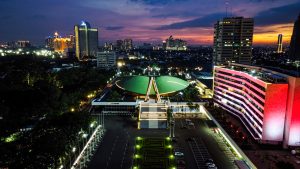Indonesians and members of the international community have expressed shock and dismay over the National House of Representatives’ recent passage of a revised criminal code that bans foreigners and locals from sex and cohabitation outside marriage, makes it a crime to insult the president or vice president, and criminalizes the holding of protests without permission.
Many foreigners, in particular, were surprised to find Indonesia’s government embracing conservatism and turning back the clock on democracy. After all, Indonesia has often been touted as a pluralistic society that has enjoyed an open and free democracy ever since the fall of Suharto’s New Order regime in the spring of 1998, an era we often refer to as reformasi.
Yet such perceptions are misguided. In reality, the truth is that Indonesia has experienced a steady democratic backsliding ever since the election to the office of President Joko Widodo, or Jokowi, in 2014. Civil rights, democratic norms, and independent political institutions have come under continuous attack. The new criminal code only formalizes what has been for too long an illiberal and semi-authoritarian government.
Only now has the international community come to realize that Indonesia’s democracy is not what they were led to believe. And for myself and the vast majority of Indonesians, there is a sense of deep disappointment.
In my career holding ministerial positions, first inside the Abdurrahman Wahid administration (1999-2001), more recently during the first term of Jokowi’s presidency, and now as a political activist and critic, I have had the privilege of seeing first-hand the trajectory of Indonesia’s democracy for over two decades.
Under the leadership of Wahid and his successors, Megawati Sukarnoputri and Susilo Bambang Yudhoyono, Indonesia’s democracy was pretty much in safe hands. There were occasional setbacks, but for the most part we could proudly call ourselves the largest and more genuine democracy of all the Muslim-majority countries.
In reality, Indonesia’s democratic backsliding began not this week but a decade ago. Our media has decayed in the process, making it little more than a mouthpiece for the government while users of social media have been intimidated should they post anything critical. The police have become more powerful, corrupt, and brutal, arguably even more so than they were under the Suharto regime. Much the same can be said about the National House of Representatives, renowned for its corrupt ways and which, as it turns out, is the very institution to have passed the new criminal code.
Once freedom is lost it is hard to win it back. I experienced this firsthand in the 1970s as a university student activist. Publicly critical of the Suharto regime, I was consequently thrown in jail. When I was released, it would be over two decades until a new generation of student leaders successfully led calls for Suharto to resign from office. The new criminal code, which comes into effect three years from now, is the preamble for future presidents to abuse power and bring Indonesia firmly back into an era of Suharto-like politics.

































